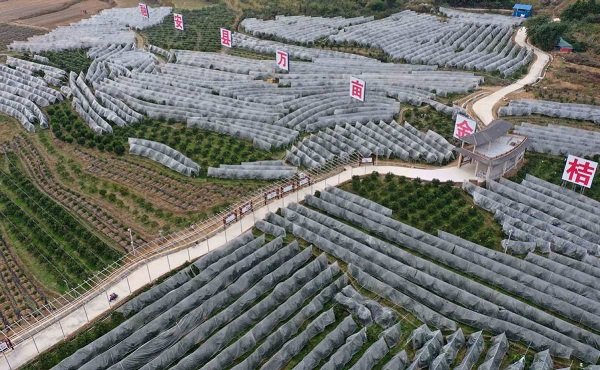Kumquats help drive village economy
Updated: 2020-09-12

A view of the kumquat field in Fule village in Rong'an, a county in Guangxi Zhuang autonomous region, in December. QIN QINGHE/FOR CHINA DAILY
Lucrative business
Fule village has grown into a kumquat kingdom. The lucrative business has seen young people coming back to the village to grow and sell the fruit. The so-called "kumquat industry" has now turned into a main driver of Rong'an's economy.
So far, more than 20,000 villagers have been lifted out of poverty through the growing and selling of kumquat, which we now call the "fruit of fortune", said Chen Hong, Party secretary of Rong'an county.
Lai is planning to sell Rong'an kumquat in Southeast Asia.
In China, most of the impoverished people are farmers. As part of the "targeted poverty alleviation", the anti-poverty campaign conceived by President and CPC Central Committee General Secretary Xi Jinping, the plant protection station of Rong'an County Agricultural Bureau launched the farmer field schools in 2013.
The FFS program, an agricultural production-based training and farmer education tool, has shown to play a vital role in poverty reduction among poor smallholder farmers.
In 2017, the station established the Integrated Pest Management Farmer Field School of China and FAO(Food and Agriculture Organization) Pesticide Risk Reduction Program targeting local farmers.
After receiving extensive IPM FFS training on field observations, plant growth maps, agroecological system analysis and insect zoos, farmers in Rong'an significantly improved both their agricultural practices and profits.
The FFS training is based on participatory discussion, which strengthens farmers' independent decision-making capacity. The training sessions enabled them to make the right decisions in different situations, balancing profits and risks.
As a result, using their market knowledge and intensified crop production, farmers significantly increased their profits.
Some of the best trainees have become key experts in the village. Some trainees have become facilitators, village officials and poverty reduction leaders by participating in the interactive training.
Yang Jinyi, chairman of Bide Agriculture Co in Rong'an county, is one of the examples of a farmer who has turned expert in growing kumquat. He was part of the first group of trainees at the FFS in 2013.
"I visit orchards in the village for 20 days in a month, talking with farmers about the issues they have in growing kumquat," Yang said.
Yang's company has grown 200 hectares of kumquat, hiring more than 700 local farmers. The company offers them free training and technical support.
The impoverished farmers can also get things such as fertilizer and pesticide from the company. They are allowed to pay back after they sell their kumquat.
Chen Wenge, head of Rong'an's plant protection station, said: "Our FFS program offers lessons that cater to the needs of local farmers and encourage them to reduce the use of fertilizer, pesticide and insecticide."
"Some of the kumquat brands the village produces have received the certificates issued by Hong Kong Standards and Testing Centre, making Hong Kong and even other international markets accessible for their fruit," Chen added.



